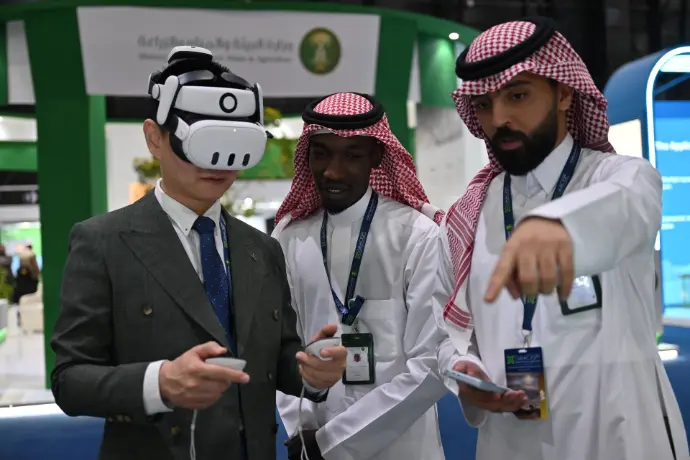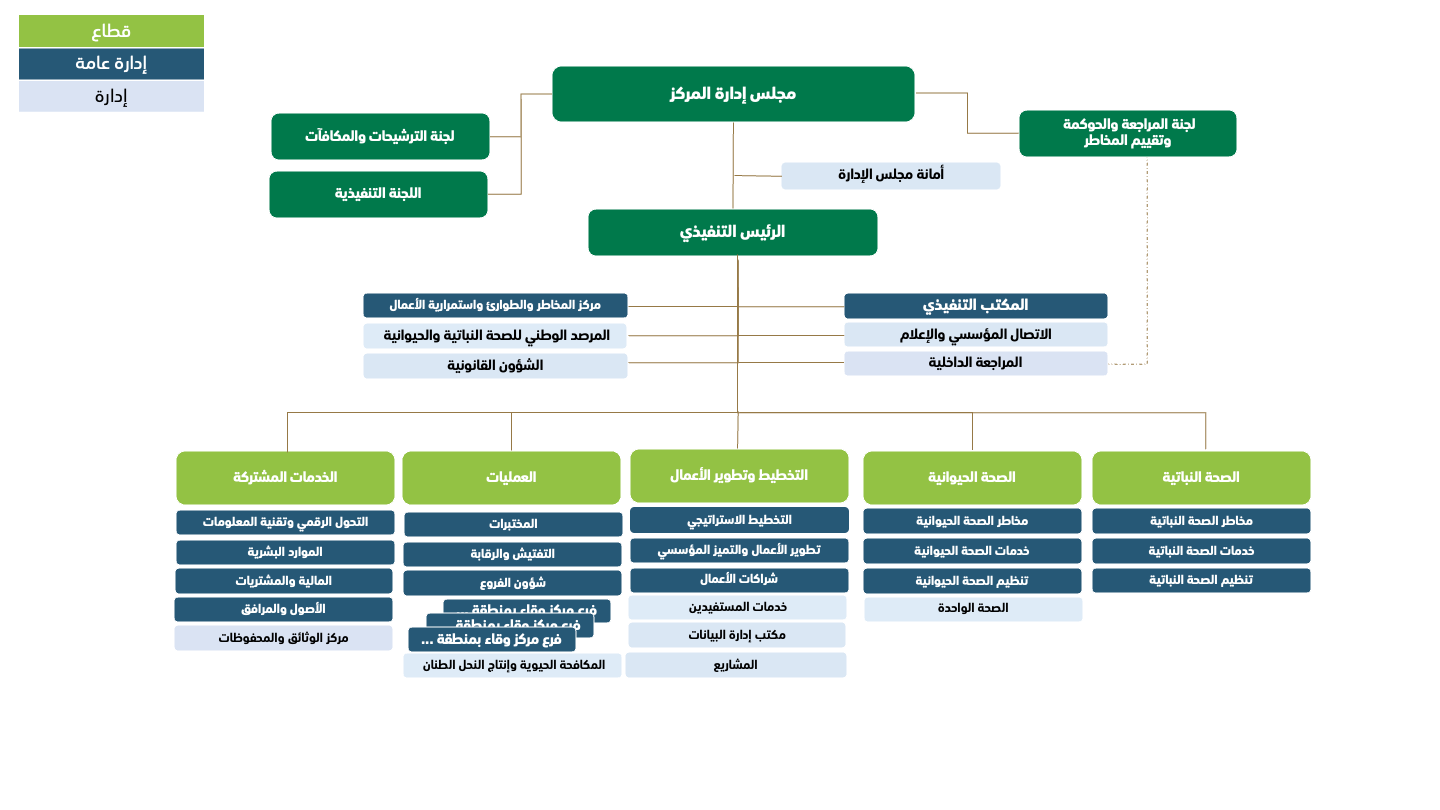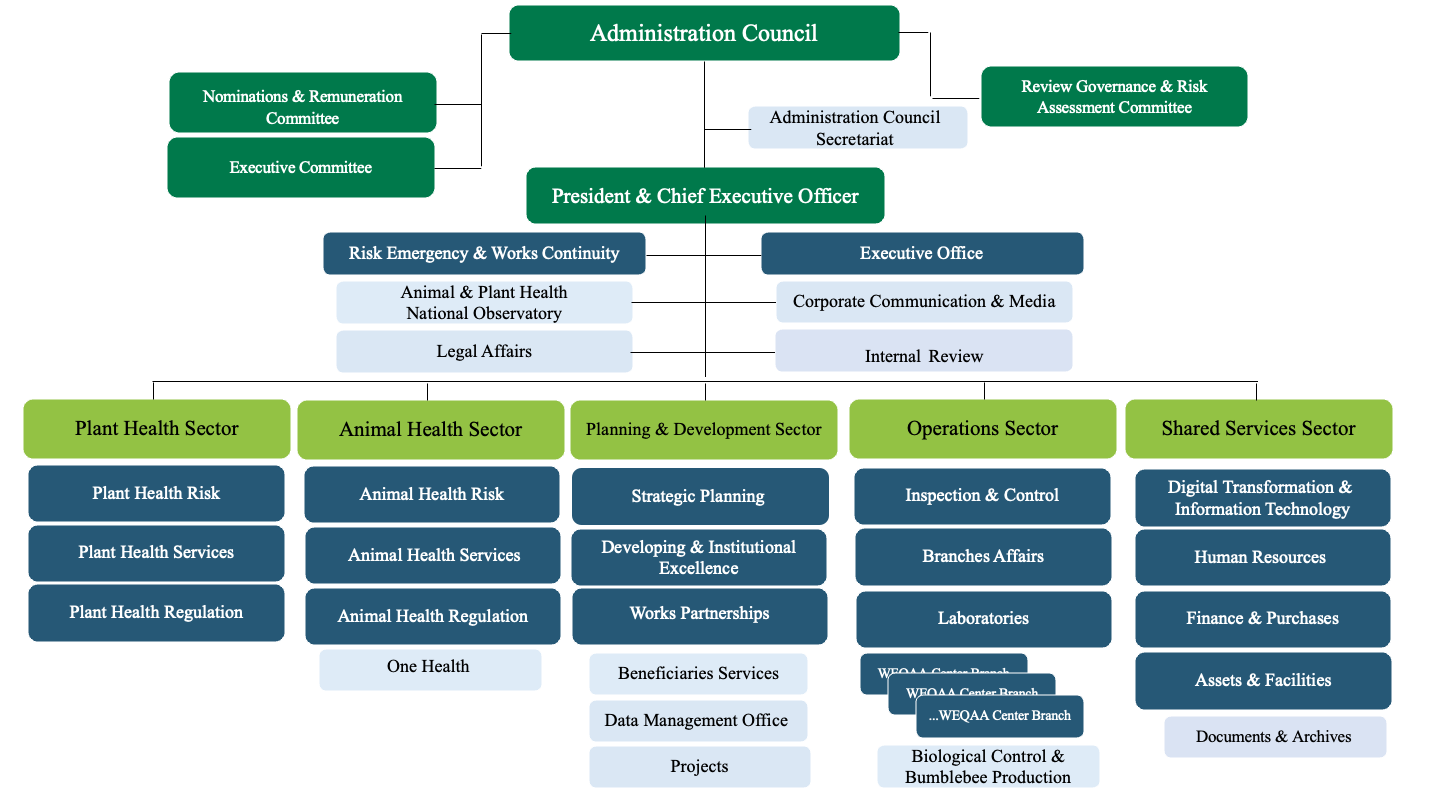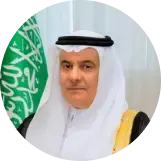-
About the Center
-
CEO's Message
-
Board of Directors
-
Vision, Mission and Values
-
Center’s Functions
-
Strategic Objectives
-
Center’s Roles
-
Organizational Structure
About the Center
The National Center for the Prevention and Control of Plants Pests and Animal Diseases, “Weqaa,” is an administratively and financially independent center operating under a board of directors chaired by His Excellency the Minister of Environment, Water and Agriculture. The Center is dedicated to protecting plant and animal wealth from pests and diseases, ensuring the safety of plant and animal production, and safeguarding public health from the risks of zoonotic diseases, in order to enhance food security and support sustainable agricultural development in the Kingdom




The Cabinet Resolution was issued
Under No. (152), dated 3/3/1442 AH. Approving: the Regulation of the National Center for the Prevention and Control of Plants Pests and Animal Diseases

CEO's Message

His Excellency
Eng. Aymen bin Saad Al Ghamdi
Chief Executive Officer
The Kingdom of Saudi Arabia, through Vision 2030, is striving to achieve food security by applying the best environmental sustainability strategies and implementing effective plans and procedures in plant pest prevention and animal disease control. Given the great attention that the Kingdom devotes to the plant and animal health sector, and the importance of food and animal health and their close link to factors of sustainable development and their direct impact on society, the National Center for the Prevention and Control of Plants Pests and Animal Diseases (Weqaa) was established as a specialized and independent center in plant and animal health.
Today, at this Center, we are working to raise the health standards of citizens and residents by providing safe agricultural and animal products, while exploring all means to strengthen this system and maintain its full readiness to face any risks that may arise or affect plant and animal health. This includes limiting the spread of pests and diseases and implementing comprehensive plans to develop our resources, capabilities, and partnerships in the field of food security, thereby contributing to the growth of the GDP.
Everyone working within this system is committed to preserving animal and plant wealth, protecting human, animal, and environmental health, guided by a clear vision to achieve leadership in this field. This is done through proactive steps and early control of all pests that affect the quality of agricultural crops or rangelands. This Center - God Willing - will represent a qualitative leap in combating plant pests and advancing animal health, by providing comprehensive services to beneficiaries and ultimately achieving the highest goal of sustainable food security
Vision, Mission and Values

Vision
Excellence in protecting plants and animals from pests and diseases, contributing to food security and the development of the agricultural sector.

Mission
Regulating, implementing, and monitoring plant pest prevention and animal disease control with efficiency and proactivity.
Values

Efficiency

Responsibility

Proactivity

Collaboration
Center’s Functions

Develop strategies, plans, programs, initiatives, procedures, and controls as required.
Establish rules necessary for the qualification and licensing of service providers.
License service providers and take lawful action against them in case of violations.
Supervise and monitor the work of service providers.
Contract with service providers to deliver preventive and curative solutions for plants and animals.
Intervene rapidly to provide necessary treatment if a service provider fails to meet its commitments or if no provider is available.
Develop a database of information on pests and animal diseases and their spread.
Develop and adopt prevention and control technologies.
Conduct regular inspections to prevent the spread of pests and monitor animal diseases in cooperation with relevant authorities.
Regulate and supervise pest and disease containment efforts, in coordination with concerned entities.
Identify potential pests and diseases, assess their impact and economic damage, document them, update the data, and publish it.
Monitor pest and disease movements in neighboring countries, take necessary measures, and issue early warnings
Obtain data related to its functions from individuals, government entities, and non-governmental entities.
Provide technical and consulting services in the field of pest and animal disease control.
Issue annual periodic reports and statistics on pests and animal diseases after coordination with the Ministry.
Organize exhibitions, conferences, seminars, and awareness campaigns on pest and animal disease control, in coordination with relevant authorities.
Conclude memoranda of understanding and agreements, in accordance with applicable regulations, with local authorities, government entities, and non-governmental entities including companies and institutions, to benefit from the best technologies, systems, research, and studies in fields related to pest and disease control.
Any other function related to the Center’s objectives as approved by the Board.
Strategic Objectives
The Center aims to implement and execute policies approved by the Ministry for combating plant pests and animal diseases. This is achieved by taking preventive and remedial measures to ensure the health and sustainability of plants and animals, strengthening private sector participation, and unifying efforts between public and private entities in this field.

Strengthening the plant health to protect plant wealth and reduce the risks of plant pests and animal diseases.”

Integrated system for controlling animal diseases and their vectors in line with the One Health Approach

Raising the early warning efficiency and emergency response.

Enhancing the financial Sustainability and technical capabilities

Contributing to Enhancement of Commitment and implementing a comprehensive governance that encourages coordination and promotes public-private sector participation

Developing the effective operating model of the Center and human capacity development
Center’s Roles

Social Role
- Increase consumer confidence in local and imported animal and agricultural products.
- Raise awareness of agricultural and animal health practices within integrated management.
- Diversify sources of plant and animal production at competitive prices.
- Ensure sustainability of animal production and agriculture.
- Preserve animal and plant wealth.
- Contribute to achieving sustainability across the Center’s activities

Environmental Role
- Preserve biodiversity and ecological balance (sustainability).
- Protect the environment, water, and agriculture from pollution caused by veterinary pharmaceuticals and chemical pesticides
- Contribute to biodiversity and ecological balance through the use of modern technologies.

Health Role
- Contribute to the control of epidemic and endemic animal diseases and economic plant pests, protecting the health of animals, humans, and the environment.
- Improve health standards for citizens and residents by providing safe animal and agricultural products.
- Activate the role of technology in helping to control and combat epidemic and endemic animal diseases and plant pests.
- Improve data quality and, as a result, improve the quality of decisions made.

Economic Role
- • Meet global market demands by marketing safe animal and agricultural products and contribute
- to increasing the Gross Domestic Product (GDP).
- • Provide local animal products and natural enemies at the local and regional levels without the need for imports.
- • Reduce treatment costs for human diseases that may arise from veterinary pharmaceuticals and chemical pesticides
- • Reduce losses resulting from the use of unreliable veterinary


 مسجل لدى هيئة الحكومة الرقمية برقم:
مسجل لدى هيئة الحكومة الرقمية برقم:















